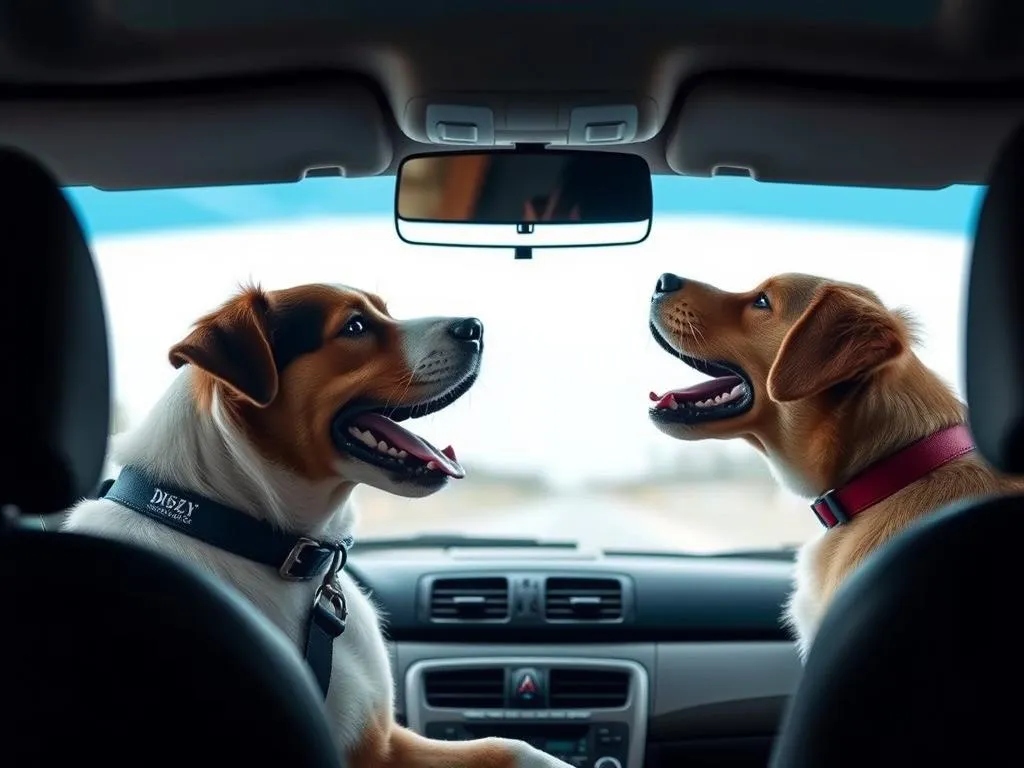
Introduction
Dogs barking in the car can be more than just a nuisance; it can become a serious distraction for drivers and create an uncomfortable environment for passengers. Understanding how to stop a dog from barking in the car is essential for both the safety of the journey and the wellbeing of your furry friend. Excessive barking can stem from various reasons, including anxiety, boredom, and even territorial behavior, and addressing these issues is crucial for a peaceful ride. This article will delve into the reasons behind barking, the impact it has on you and your dog, and practical solutions to ensure enjoyable car trips.
Understanding Dog Barking
Reasons Dogs Bark in the Car
Anxiety and Stress: For many dogs, being in a moving vehicle can trigger feelings of anxiety. The unfamiliar sounds, sights, and sensations can be overwhelming, leading to barking as a means of expressing discomfort.
Excess Energy: Dogs that do not receive sufficient physical or mental stimulation may exhibit excess energy during car rides. This energy often manifests as barking, which can be a way to release pent-up excitement or frustration.
Territorial Behavior: Dogs are naturally territorial animals. When they see people, animals, or other stimuli outside the car, they may bark in an effort to protect their perceived territory.
Attention-Seeking: Some dogs bark to gain their owner’s attention. If they learn that barking results in interaction, whether positive or negative, they may continue this behavior during car rides.
The Impact of Barking
On the Dog: Excessive barking can indicate distress and may lead to further behavioral issues if not addressed. Dogs may become increasingly anxious, leading to a cycle of barking that can escalate over time.
On the Driver: When a dog barks excessively in the car, it can become a significant distraction for the driver. This distraction poses safety risks, as it can divert attention from the road.
On Passengers: Barking can create an uncomfortable environment for other passengers, making car rides unpleasant. This discomfort can deter some from traveling with a dog altogether.
Preparing for the Journey
Pre-Trip Training
Basic Commands: Teaching your dog basic commands such as “quiet” and “stay” is a fundamental part of training. These commands can help establish control and provide a means of communication during car rides.
Desensitization: Gradually getting your dog accustomed to the car environment is essential. Start by allowing your dog to explore the car while it’s stationary, rewarding calm behavior with treats and praise.
Creating a Comfortable Environment
Safety Restraints: Proper harnesses or crates can ensure your dog’s safety while minimizing distractions. Restraining your dog can reduce the likelihood of excessive movement and barking.
Comfort Items: Bringing familiar items, such as a blanket or a favorite toy, can help soothe your dog. These items provide comfort and a sense of security, making the car feel less threatening.
Temperature Control: Maintaining a comfortable temperature in the car is important. Dogs can become agitated in extreme heat or cold, leading to excessive barking. Always ensure the car is well-ventilated and comfortable for your pet.
Training Techniques to Curb Barking
Positive Reinforcement
Rewarding Quiet Behavior: One of the most effective ways to train your dog is through positive reinforcement. When your dog remains quiet in the car, reward them with treats and praise. This reinforces the desired behavior and encourages them to remain calm.
Clicker Training: Using a clicker can enhance training effectiveness. The clicker provides a consistent sound to mark desired behavior, followed by a reward. This method helps dogs understand that being quiet is a behavior worth repeating.
Distraction Methods
Interactive Toys: Keeping your dog occupied during the ride can significantly reduce barking. Consider using interactive toys that challenge your dog mentally and physically, such as treat-dispensing toys.
Calming Music: Certain types of music have been shown to have a calming effect on dogs. Playing soft, soothing music during the ride may help relax your dog and reduce barking.
Behavioral Modifications
Gradual Exposure to Car Rides: Start with short trips to help your dog acclimate to the car. Gradually increase the duration of these trips, providing treats and praise for calm behavior along the way.
Counter-Conditioning Techniques: This involves changing your dog’s emotional response to the car. Pairing the car with positive experiences, like treats or playtime, can help shift their perception from negative to positive.
During the Car Ride
Setting Up for Success
Before Leaving: Establish a calm pre-ride routine. Allow your dog to relieve themselves before getting in the car to minimize discomfort. A brief play session can also help burn off excess energy.
Starting the Engine: Before embarking on longer trips, let your dog get used to the sounds of the engine. Start the car and allow them to sit inside for a few moments without driving, rewarding them for staying calm.
Managing Barking in the Moment
Stay Calm: Your demeanor can greatly affect your dog’s behavior. If they start barking, remain calm and avoid yelling, as this may escalate the situation. Instead, speak softly and reassuringly.
Redirecting Attention: If your dog begins to bark, redirect their attention to a toy or treat. Engaging them with something they find interesting can help break the barking cycle.
When to Stop the Car
Assessing the Situation: If barking becomes excessive, it may be necessary to pull over. Take a moment to assess the situation, ensuring your dog is comfortable and calm before continuing.
Using Breaks Wisely: Plan your route to include breaks, allowing your dog time to relieve stress and exercise. A short walk can help your dog expend energy and return to the car more relaxed.
Additional Tips and Resources
Professional Help
When to Seek a Trainer: If you find that your dog continues to bark excessively despite your efforts, it may be time to seek professional assistance. A certified dog trainer can provide tailored strategies to address barking issues.
Behavioral Specialists: For severe barking problems, consulting a dog behaviorist may be beneficial. These specialists can offer insights into underlying issues and help develop a comprehensive training plan.
Useful Tools and Products
Anti-Bark Collars: Consider the use of anti-bark collars as a last resort. These collars can help deter excessive barking but should be used with caution and under professional guidance.
Calming Aids: There are various calming aids available, including supplements and pheromone diffusers, which can help reduce anxiety during travel. Consult with your veterinarian to find suitable products for your dog.
Conclusion
To effectively learn how to stop a dog from barking in the car, it’s essential to understand the reasons behind the behavior and implement consistent training strategies. From preparing for the journey with a comfortable environment to employing positive reinforcement techniques, each step contributes to a more enjoyable car ride. Remember, training takes time and patience; gradual improvements will lead to success. Enjoy your travels with your dog by applying these techniques and fostering a calm atmosphere during your journeys.
FAQs
How long does it take to train a dog to stop barking in the car?
The time it takes to train a dog to stop barking in the car can vary significantly based on the dog’s temperament, the training methods used, and the consistency of practice. Some dogs may show improvement within a few rides, while others may take weeks or even months.
What should I do if my dog continues to bark despite training?
If your dog continues to bark excessively despite your training efforts, consider reassessing your approach. It may be beneficial to consult a professional trainer or behaviorist for additional strategies tailored to your dog’s specific needs.
Are there specific breeds more prone to barking in the car?
While any dog can bark in the car, certain breeds known for their vocal tendencies, like Beagles or Terriers, may be more prone to this behavior. However, each dog’s experience is unique, and training can significantly help manage barking.
Can medications help with my dog’s anxiety while traveling?
In some cases, medications prescribed by a veterinarian can help alleviate a dog’s anxiety during travel. It’s essential to discuss your dog’s specific needs with a vet to determine the best course of action.









